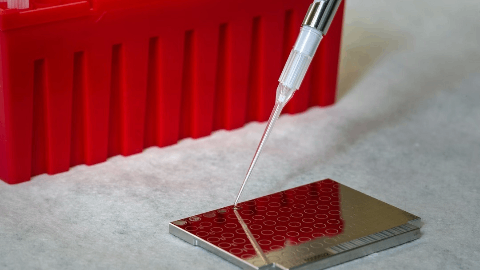预约演示
更新于:2025-05-07
Neurodegenerative Diseases
神经退行性疾病
更新于:2025-05-07
基本信息
别名 Degenerative Condition, Neurologic、Degenerative Conditions, Neurologic、Degenerative Disease of Nervous System, Unspecified + [47] |
简介 Hereditary and sporadic conditions which are characterized by progressive nervous system dysfunction. These disorders are often associated with atrophy of the affected central or peripheral nervous system structures. |
关联
5,965
项与 神经退行性疾病 相关的药物作用机制 MEK1抑制剂 [+1] |
在研机构 |
最高研发阶段批准上市 |
首次获批国家/地区 美国 |
首次获批日期2025-02-11 |
靶点 |
作用机制 TTR调节剂 |
在研适应症 |
非在研适应症 |
最高研发阶段批准上市 |
首次获批国家/地区 美国 |
首次获批日期2024-11-22 |
18,118
项与 神经退行性疾病 相关的临床试验IRCT20200221046567N1
EFFECTS OF VIRTUAL REALITY WITH MOTOR IMAGERY TECHNIQUES IN ADDITION TO ROUTINE PHYSICAL THERAPY IN PATIENTS WITH PARKINSON’S DISEASE: A RANDOMIZED CONTROLLED TRIAL
开始日期2641-07-06 |
申办/合作机构 |
NCT05931484
A Phase 2, Double-Blind, Multi-Center, Placebo-Controlled Clinical Study to Evaluate the Safety, Tolerability, Efficacy, and Pharmacokinetics of FHL-301 in Adult Patients With Parkinson's Disease
This is a phase 2, double-blind, multi-center, placebo-controlled clinical study to evaluate the safety, tolerability, efficacy, and PK of FHL-301 in adult patients with early-stage PD. Following screening, qualifying patients who meet all inclusion and exclusion criteria will enter the study and be randomized 1:1 to receive FHL-301 or Placebo at a starting dose of 200 mg BID (30 minutes before the morning and evening meals) during the 3-week titration period. To determine the tolerance of each participant for FHL-301, titration will increase by 200 mg BID every week until the maximum dose of 600 mg BID or the highest tolerated dose of 1200 mg daily is reached and maintained for 1 week. Thereafter, patients who complete the dose Titration Phase of the study will enter the Maintenance Phase and remain on the final titrated dose for up to 48 weeks post titration. If at any stage during the titration phase the participant cannot tolerate the increased dose, the dose will be decreased by 100 mg BID weekly until the highest tolerated dose is reached.
开始日期2027-11-01 |
申办/合作机构- |
NCT06828523
Assessing Perceptual Effects of Interactive Tasks
In this study, we will evaluate how solo, naive listeners perceive the speech of people with amyotrophic lateral sclerosis (ALS) and age-matched speakers produced across interactive and non-interactive contexts with an unfamiliar, naive interlocutor.
开始日期2027-10-01 |
申办/合作机构 |
100 项与 神经退行性疾病 相关的临床结果
登录后查看更多信息
100 项与 神经退行性疾病 相关的转化医学
登录后查看更多信息
0 项与 神经退行性疾病 相关的专利(医药)
登录后查看更多信息
710,666
项与 神经退行性疾病 相关的文献(医药)2026-01-01·Neural Regeneration Research
Alpha-synuclein-induced upregulation of SKI family transcriptional corepressor 1: A new player in aging and Parkinson’s disease?
Article
作者: Collins, Louise M. ; Barrett, Lauren ; Bevans, Rebekah ; O’Keeffe, Gerard W. ; Sullivan, Aideen M.
2026-01-01·Neural Regeneration Research
Potential biofluid markers for cognitive impairment in Parkinson’s disease
Article
作者: Wang, Fang ; Chen, Jieyu ; Liu, Bin ; Zhu, Liuhui ; Zhu, Yongyun ; Liang, Chunyu ; Yang, Xinglong ; Chen, Jianzhun
2026-01-01·Neural Regeneration Research
Long noncoding RNA GAS5 acts as a competitive endogenous RNA to regulate GSK-3β and PTEN expression by sponging miR-23b-3p in Alzheimer’s disease
Article
作者: Li, Zhuorong ; Liu, Jianghong ; Zhao, Kaiyue ; Zeng, Li ; Cai, Zhongdi ; Liu, Rui ; Liu, Mimin ; Sun, Ting
34,281
项与 神经退行性疾病 相关的新闻(医药)2025-05-05
IRVINE, Calif., May 5, 2025 /PRNewswire/ -- Nuravax Inc., a biotechnology company pioneering immunotherapy for neurodegenerative disorders, has been awarded a $3 million grant from the National Institutes of Health (NIH) to support Duvax, the first dual-target Alzheimer's vaccine, in its entry into human clinical trials.
Nuravax, in partnership with the non-profit Institute for Molecular Medicine (IMM), secured the award on its very first NIH grant submission, earning top-tier scores. This rare distinction highlights the scientific strength and strategic importance of the Duvax vaccine.
The grant, awarded through NIH's highly competitive SBIR Fast-Track program, will fund a critical milestone in the clinical validation of Duvax. An initial portion of the $3 million grant has been allocated to initiate the Phase 1 clinical trial evaluating the safety and immunogenicity of Duvax as a secondary prevention therapy, with the remaining funds expected later in 2025.
"This SBIR grant is a powerful endorsement of our mission to clinically validate and advance Duvax as a first-in-class vaccine for Alzheimer's prevention," said Roman Kniazev, CEO of Nuravax. "While IMM laid the scientific foundation, our focus at Nuravax is on translating that innovation into real-world impact. This funding enables us to move Duvax into clinical trials in the U.S. and brings us one step closer to delivering it as preventive therapy for individuals at risk – before symptoms begin."
Duvax is a first-in-class vaccine that targets both amyloid-beta and tau proteins, the two hallmark drivers of Alzheimer's disease, positioning it at the forefront of Alzheimer's research. Unlike conventional treatments, Duvax is designed for use during the preclinical stage, when the disease is silently progressing but before cognitive symptoms appear.
"The Phase 1 trial, supported by this SBIR grant awarded to our development and commercialization partner, Nuravax, marks a critical step in translating years of foundational research at IMM into a potential clinical breakthrough," said Dr. Michael Agadjanyan, VP of IMM and Head of Immunology. "Based on strong preclinical data, we at IMM expect Duvax to elicit a robust immune response against both Aβ and tau pathologies, an approach that could fundamentally shift the paradigm of Alzheimer's treatment from symptomatic and disease-modifying treatment (DMT) to secondary preventive therapy for cognitively unimpaired people at risk of disease."
The vaccine's use is guided by highly precise and specific blood tests that detect early pathological changes, enabling timely intervention. By clearing toxic forms of amyloid-beta and tau before irreversible damage occurs, Duvax aims to shift the treatment paradigm from symptom management to secondary preventive therapy.
About Nuravax
Nuravax is a clinical-stage biotech company developing and advancing immunotherapeutic vaccines for neurodegenerative diseases, including Alzheimer's, Parkinson's, TBI, and CTE. Focused on early intervention, Nuravax aims to alter disease progression before irreversible damage occurs. The company leads the clinical development, regulatory strategy, and manufacturing of Duvax, a dual-target vaccine licensed from the Institute for Molecular Medicine (IMM), a nonprofit dedicated to neurodegenerative disease research.
About IMM
The Institute for Molecular Medicine (IMM) is a non-profit research organization dedicated to understanding, preventing, and curing chronic human diseases, with a focus on neurodegeneration. IMM is advancing MultiTEP — a universal vaccine platform technology that enables the development of diverse vaccine formats, including DNA, RNA, and recombinant protein-based designs.
Disclaimer: Research reported in this publication was supported by the National Institute On Aging of the NIH under Award Number R44AG091903. The content is solely the responsibility of the authors and does not necessarily represent the official views of the NIH.
SOURCE Nuravax Inc
WANT YOUR COMPANY'S NEWS FEATURED ON PRNEWSWIRE.COM?
440k+
Newsrooms &
Influencers
9k+
Digital Media
Outlets
270k+
Journalists
Opted In
GET STARTED
疫苗免疫疗法快速通道临床1期
2025-05-05
FDA Authorizes Expanded Access Program (EAP) to Help Provide Access to SPG302 for 200 ALS Individuals Ineligible for Clinical Study
EAP Supports Real-world Data Collection Concurrent to Ongoing Clinical Studies of SPG302
LOS ANGELES, May 5, 2025 /PRNewswire/ -- Spinogenix, Inc., a clinical-stage biopharmaceutical company pioneering first-in-class therapeutics that restore synapses to improve the lives of patients worldwide, today announced that it has received notification from the Food and Drug Administration (FDA) to begin its Expanded Access Program (EAP) for SPG302 in the United States (U.S.) for people living with Amyotrophic Lateral Sclerosis (ALS) that meet program eligibility criteria.
SPG302 is being developed as the first synaptic regenerative approach to treating ALS, with the potential to slow or reverse declines in cognitive and motor function.
Spinogenix CEO and Founder Dr. Stella Sarraf stated, "FDA clearance to launch this new EAP supports its awareness of SPG302's safety and potential efficacy, and the need for ALS patients to have access to novel treatments. This EAP reflects our dedication to giving hope to people living with ALS and their families, providing treatment to those who do not qualify for, or may be unable to participate in, our ongoing clinical trial. Innovation is urgently needed to tackle ALS, a disease with devastating impact, and we are committed to ensuring that no patients who may benefit are left behind."
EAPs are designed to allow individuals with serious or life-threatening conditions to access investigational treatments outside of a clinical trial that are not yet approved by the FDA.
Dan Doctoroff, founder and chairman of Target ALS, and the first individual to receive SPG302 in the U.S. as part of a separate EAP protocol commented, "The notion that ALS is an untreatable disease is outdated. My own experience with SPG302, the first synaptic regenerative therapy in clinical development, has shown that partial stabilization of the disease is a possibility. I am thrilled that the FDA has recognized the value of allowing Spinogenix to expand access to SPG302, allowing others battling ALS to have a similar beneficial experience."
In addition to serving the ALS community by providing access to an innovative investigational therapy, the EAP enables the collection of real-world data on SPG302 safety and efficacy that can support its clinical development. The FDA previously granted SPG302 Orphan Drug Designation for the treatment of ALS.
Spinogenix recently completed a Phase 2 ALS trial in Australia, and patients have been offered a continuation of treatment in an open label extension. Additional information on the trial (NCT05882695) and open label extension (NCT06903286) may be found on ClinicalTrials.gov.
About SPG302
SPG302 is a once-a-day pill being developed as a regenerative treatment for neurodegenerative and neuropsychiatric diseases with the unique ability to restore synapses, the key connections between neurons that allow people to think, plan, remember, and control movement. The synaptic regenerative activity of SPG302 represents a first-in-class approach to treating these diseases and has the potential to reverse declines in cognitive, respiratory, and motor function. SPG302 has been granted U.S. FDA Orphan Drug Designation for the treatment of ALS and has received preclinical support from the U.S. National Institutes of Health and the Department of Defense.
Spinogenix has completed a Phase 1/2 study in Australia (NCT05882695) assessing the safety, pharmacokinetics and pharmacodynamics of once-daily dosing of SPG302 in healthy volunteers and up to 48 weeks of treatment in ALS patients. Additional information on the global clinical trials evaluating SPG302 for the treatment of schizophrenia and Alzheimer's disease can be found on ClinicalTrials.gov (NCT06442462 and NCT06427668).
About Expanded Access to SPG302
Access to SPG302 is available in the U.S. for certain adults with ALS who meet eligibility criteria for participation in the FDA-authorized Expanded Access Program for SPG302. More information about the U.S. EAP can be requested through [email protected].
About Spinogenix
Current treatments for neurodegenerative, neuropsychiatric and neurodevelopmental conditions primarily focus on slowing disease progression or minimizing symptoms, leaving many without hope for improvement. Spinogenix is aiming to transform the treatment of these conditions through its pioneering first-in-class and paradigm-shifting synaptic regenerative and synaptic corrective therapeutics designed to restore depleted synapses and reverse synaptic degeneration and dysfunction – offering patients and their families a new reality of hope.
Spinogenix is developing two novel therapeutics: SPG302, which triggers neurons to produce new glutamatergic synapses and restore cognitive, motor, and other functions in ALS, Alzheimer's disease, schizophrenia and other diseases; and SPG601, which works at the synaptic level to correct specific dysfunctions in Fragile X Syndrome (FXS) that underlie many core symptoms. The company has received FDA Orphan Drug designation for both ALS and FXS, as well as FDA Fast Track designation for FXS. More information on Spinogenix can be found at or follow us on LinkedIn.
Media Relations
Nechama Rosengarten
FINN Partners
[email protected]
Investor Relations
Dan Albosta
Spinogenix, Inc.
[email protected]
SOURCE Spinogenix
WANT YOUR COMPANY'S NEWS FEATURED ON PRNEWSWIRE.COM?
440k+
Newsrooms &
Influencers
9k+
Digital Media
Outlets
270k+
Journalists
Opted In
GET STARTED
孤儿药快速通道临床2期临床申请
2025-05-05
- Recently presented data demonstrated sustained functional improvement with DYNE-251 treatment through 18 months -
- Data from the fully enrolled DELIVER registrational expansion cohort is planned for late 2025 -
April 24, 2025 -- Dyne Therapeutics, Inc. (Nasdaq: DYN), a clinical-stage company focused on advancing life-transforming therapeutics for people living with genetically driven neuromuscular diseases, today announced that the European Commission (EC) has granted orphan drug designation for DYNE-251 for the treatment of Duchenne muscular dystrophy (DMD). DYNE-251 is being evaluated in the Phase 1/2 DELIVER global clinical trial in individuals with DMD who are amenable to exon 51 skipping. Long-term clinical data from the ongoing DELIVER trial of DYNE-251 that demonstrated unprecedented and sustained functional improvement at the selected registrational dose were presented in March at the 2025 Muscular Dystrophy Association (MDA) Clinical & Scientific Conference. Functional assessments in the DELIVER trial include Stride Velocity 95th Centile (SV95C), an objective digital outcome that is accepted as a primary endpoint for DMD clinical trials in Europe.
“Our recent long-term DELIVER trial results demonstrated clinically relevant and sustained functional improvement through 18 months, including as assessed by SV95C, which may support a strong rationale for regulatory approval in Europe,” said Doug Kerr, MD, PhD, chief medical officer of Dyne. “We are pleased that the EC has granted orphan drug designation to DYNE-251, reinforcing our belief that our next-generation exon 51 skipping investigational therapy for DMD may be able to bring clinically meaningful functional improvement to those living with this devastating disease. With full enrollment of the registrational expansion cohort in the DELIVER trial complete, we look forward to sharing data from this cohort in late 2025 and the potential to move forward with our first regulatory submissions in early 2026.”
The EC grants orphan drug designation to drugs and biologics intended for the treatment, diagnosis or prevention of rare, life-threatening or chronically debilitating diseases or conditions that affect fewer than five in 10,000 people in the European Union (EU). Orphan designation provides companies with certain benefits, including reduced regulatory fees, clinical protocol assistance, research grants and the potential for up to 10 years of market exclusivity in the EU if approved. DYNE-251 was also granted U.S. Food and Drug Administration (FDA) orphan drug and rare pediatric disease designations in March 2023.
Key Milestones for the DELIVER Trial
Dyne continues to pursue expedited approval pathways globally for DYNE-251 in patients with DMD who are amenable to exon 51 skipping.
Dyne has fully enrolled the registrational expansion cohort of 32 patients as part of the DELIVER trial. Data from this cohort are planned for late 2025.
Dyne anticipates filing a Biologics License Application (BLA) submission for US accelerated approval in early 2026.
DELIVER is a randomized, placebo-controlled, double-blind, Phase 1/2 clinical trial evaluating the safety, tolerability and efficacy of DYNE-251 in patients with Duchenne muscular dystrophy (DMD) who are amenable to exon 51 skipping. The multiple ascending dose (MAD) portion of the study resulted in the selection of a registrational dose and regimen of 20 mg/kg every four weeks. A registrational expansion cohort to support potential regulatory submissions for expediated approvals, including accelerated approval in the U.S., is fully enrolled. The primary endpoint for this cohort is the change from baseline in dystrophin protein levels as measured by Western blot. For more information on the DELIVER trial, visit clinicaltrials.gov (NCT05524883) and euclinicaltrials.eu (2023-510351-31-00).
DYNE-251 is an investigational therapeutic being evaluated in the Phase 1/2 global DELIVER clinical trial for people living with DMD who are amenable to exon 51 skipping. DYNE-251 consists of a phosphorodiamidate morpholino oligomer (PMO) conjugated to a fragment antibody (Fab) that binds to the transferrin receptor 1 (TfR1), which is highly expressed on muscle. It is designed to enable targeted muscle tissue delivery and promote exon skipping in the nucleus, allowing muscle cells to create internally shortened, near full-length dystrophin protein, with the goal of stopping or reversing disease progression. DYNE-251 has been granted fast track, orphan drug and rare pediatric disease designations by the U.S. Food and Drug Administration for the treatment of DMD mutations amenable to exon 51 skipping.
In addition to DYNE-251, Dyne is building a global DMD franchise and has preclinical programs targeting other exons, including 53, 45 and 44.
DMD is a rare disease caused by mutations in the gene that encodes for dystrophin, a protein critical for the normal function of muscle cells. These mutations, the majority of which are deletions, result in the lack of dystrophin protein and progressive loss of muscle function. DMD occurs primarily in males and affects an estimated 12,000 to 15,000 individuals in the U.S. and 25,000 in Europe. Loss of strength and function typically first appears in pre-school age boys and worsens as they age. As the disease progresses, the severity of damage to skeletal and cardiac muscle often results in patients experiencing total loss of ambulation by their early teenage years and includes worsening cardiac and respiratory symptoms and loss of upper body function by the later teens. There is no cure for DMD, and currently approved therapies provide limited benefit.
Dyne Therapeutics is discovering and advancing innovative life-transforming therapeutics for people living with genetically driven neuromuscular diseases. Leveraging the modularity of its FORCE™ platform, Dyne is developing targeted therapeutics that deliver to muscle and the central nervous system (CNS). Dyne has a broad pipeline for neuromuscular diseases, including clinical programs for myotonic dystrophy type 1 (DM1) and Duchenne muscular dystrophy (DMD), and preclinical programs for facioscapulohumeral muscular dystrophy (FSHD) and Pompe disease.
The content above comes from the network. if any infringement, please contact us to modify.

孤儿药快速通道临床研究临床结果
分析
对领域进行一次全面的分析。
登录
或

Eureka LS:
全新生物医药AI Agent 覆盖科研全链路,让突破性发现快人一步
立即开始免费试用!
智慧芽新药情报库是智慧芽专为生命科学人士构建的基于AI的创新药情报平台,助您全方位提升您的研发与决策效率。
立即开始数据试用!
智慧芽新药库数据也通过智慧芽数据服务平台,以API或者数据包形式对外开放,助您更加充分利用智慧芽新药情报信息。
生物序列数据库
生物药研发创新
免费使用
化学结构数据库
小分子化药研发创新
免费使用






